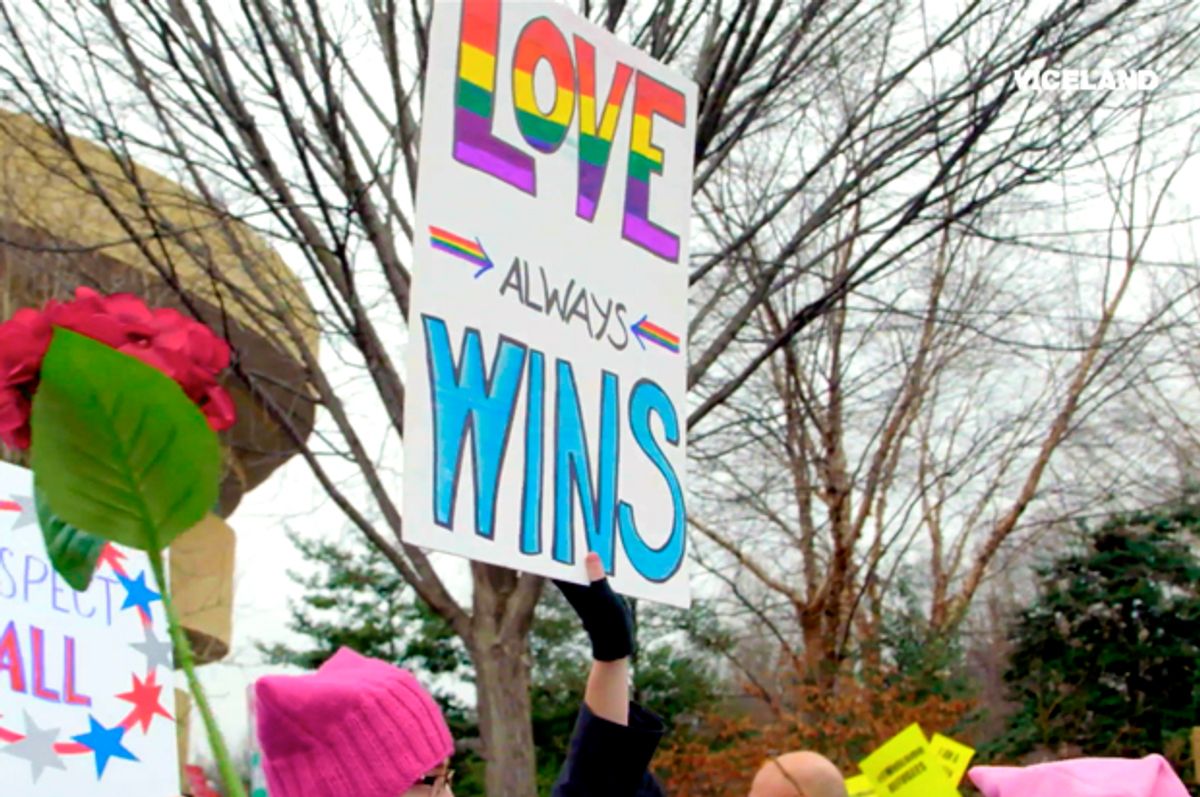“The journey towards equality is not a linear journey.” – Parmesh Shahani, author of “Gay Bombay: Globalization, Love and (Be)longing in Contemporary India”
Before the rise of 45 and his rightwing minions, if you regularly watched “GAYCATION,” a docu-series/travelogue in which Ellen Page and her best friend Ian Daniel explore LGBTQ cultures around the world, you might have leaned back on your Pottery Barn sofa and felt like you had it made in the shade. “At least I’m not gay in ________. At least I have marriage equality,” you might have remarked before taking sinking your teeth into that spicy tuna roll. “Babe, did you hear what that right wing Ukrainian Neo Nazi talking to Ellen just said about Jews??”
Now, following the the horror show of the election, for many LGBTQ Americans, it’s yet another heinous wakeup call. Workplace discrimination based on sexual orientation, reversal of marriage equality or HB2 all loom large like a bewigged bogeyman in the night, causing psychic fracture for some and galvanizing others to take to the streets to raise the rainbow banner high for the disenfranchised. It’s this aftermath and the ensuing protests that Ellen Page and Ian Daniel document in their special “GAYCATION: UNITED WE STAND,” available for free on Viceland for the month of May.
GAYCATION: UNITED WE STAND is a tribute to the the activists on the ground devoting their energy, time and twerking to the fight for equality, activist luminaries such as filmmaker Michael Moore and Monica Torres, a member of Work for Peace who articulates what she sees as her role in the struggle: “The way history is being told is often skewed,” she says. “Certain voices are left out. So I’m going to be writing poetry making sure that shit gets into archives so that I know I was here.”
Shot in Washington D.C., the special is also a continued call to arms as well as a reminder that there are still many for whom the fight is simply ongoing.
“We’re reflecting on the individuals who have been struggling for a long time and for the individuals for whom it’s gotten even worse, such as trans women losing access to healthcare,” Ellen Page tells me.
“Now that Trump has become president, people are more aware,” Ian Daniel adds. “We have witnessed people coming together and learning from past movements.”
“At the same time, we find it important to hear the stories that are producing the hate, both politically, socially and culturally,” Page says. “We have to talk to people who have murdered people and are violent sometimes. It’s tough.”
Partway into the episode, Ellen and Ian attend the DeploraBall, the party to celebrate the inauguration of Trump, with Lucian Wintrich, a reporter for the Gateway Pundit, who recently became the site’s first Whitehouse correspondent. Wintrich first gained notoriety with a photo series called “Twinks for Trump,” in which he posed suggestively to troll both the right for its anti-gay legislation and the left for portraying the right as, “obese Midwesterners who don’t read the paper.” Page, Daniel and Wintrich sit down to discuss their opposing viewpoints — this is something that happens for a few minutes in each episode — and quickly arrive at an impasse. Page advances the notion of intersectionality, how can Trump be pro-LGBT if he’s anti-immigrant, and Wintrich the idea that if you only read isolated quotes in Huffington Post, of course he seems that way! Gawd! At which point Daniel says Wintrich is on the other side of the resistance and he holds Wintrich responsible for what happens. It’s a stalemate, but a fascinating one.
“There’s a divide within the community and you see it all over the world,” Daniel tells me. “But the Trump presidency made people listen to each other. We have potential for gay, white men to understand the experience of a trans person of color and then stick together and lift each other up. It’s all intertwined.”
“We aim to connect the dots,” Page says.
Subsequently, Page and Daniel visit Casa Ruby, an essential shelter and support agency offering services for trans women of color, and speak to founder Ruby Corado and some of the caseworkers and clients about the specific challenges they now face. One spoke of how Casa Ruby took him off the streets. Another of her fear that her hormones might become inaccessible. A caseworker who had lived through the “Civil Rights Era and Ronald Reagan” gets choked up as she says that she hopes that this country is “put at notice that we are here and we are here to stay.”
“Being a part of the LGBTQ movement for equality and equity is intersectional,” Page says. “There’s a growing understanding that all these issues are related and you can’t separate race, class and gender. This is how we can end discrimination and shift global consciousness. We’re humbled by how much we’ve learned. We’ve been able to sit with so many inspiring people who put their life on the line every day to make people feel less alone.”
In the end, the message is togetherness. This might not be anything new or groundbreaking, but it’s refurbished here to be more open-ended. Where some criticized the women’s march for being too white, GAYCATION: UNITED WE STAND reflects a diversity of faces, voices, experiences and opinions. Save Wintrich, these opinions come from the left, so the dialogue remains lopsided, but it gets the point across: “We are proof of the power we have when we stand together.”



Shares